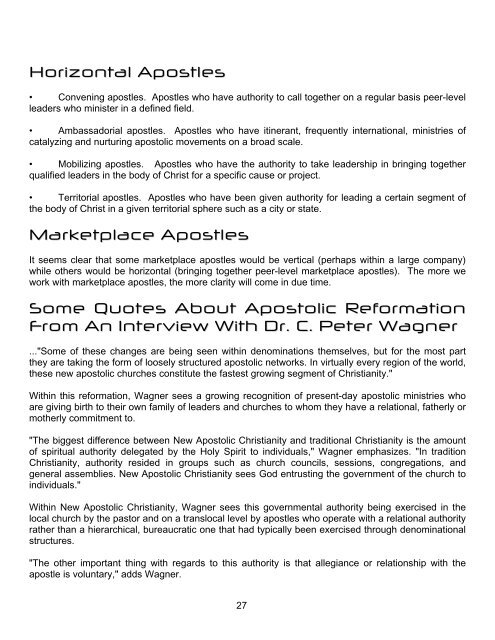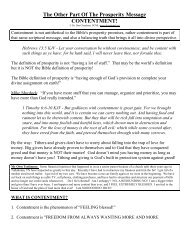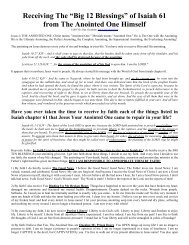Apostolic Alignment - FaithSite.com
Apostolic Alignment - FaithSite.com
Apostolic Alignment - FaithSite.com
You also want an ePaper? Increase the reach of your titles
YUMPU automatically turns print PDFs into web optimized ePapers that Google loves.
Horizontal Apostles<br />
• Convening apostles. Apostles who have authority to call together on a regular basis peer-level<br />
leaders who minister in a defined field.<br />
• Ambassadorial apostles. Apostles who have itinerant, frequently international, ministries of<br />
catalyzing and nurturing apostolic movements on a broad scale.<br />
• Mobilizing apostles. Apostles who have the authority to take leadership in bringing together<br />
qualified leaders in the body of Christ for a specific cause or project.<br />
• Territorial apostles. Apostles who have been given authority for leading a certain segment of<br />
the body of Christ in a given territorial sphere such as a city or state.<br />
Marketplace Apostles<br />
It seems clear that some marketplace apostles would be vertical (perhaps within a large <strong>com</strong>pany)<br />
while others would be horizontal (bringing together peer-level marketplace apostles). The more we<br />
work with marketplace apostles, the more clarity will <strong>com</strong>e in due time.<br />
Some Quotes About <strong>Apostolic</strong> Reformation<br />
From An Interview With Dr. C. Peter Wagner<br />
..."Some of these changes are being seen within denominations themselves, but for the most part<br />
they are taking the form of loosely structured apostolic networks. In virtually every region of the world,<br />
these new apostolic churches constitute the fastest growing segment of Christianity."<br />
Within this reformation, Wagner sees a growing recognition of present-day apostolic ministries who<br />
are giving birth to their own family of leaders and churches to whom they have a relational, fatherly or<br />
motherly <strong>com</strong>mitment to.<br />
"The biggest difference between New <strong>Apostolic</strong> Christianity and traditional Christianity is the amount<br />
of spiritual authority delegated by the Holy Spirit to individuals," Wagner emphasizes. "In tradition<br />
Christianity, authority resided in groups such as church councils, sessions, congregations, and<br />
general assemblies. New <strong>Apostolic</strong> Christianity sees God entrusting the government of the church to<br />
individuals."<br />
Within New <strong>Apostolic</strong> Christianity, Wagner sees this governmental authority being exercised in the<br />
local church by the pastor and on a translocal level by apostles who operate with a relational authority<br />
rather than a hierarchical, bureaucratic one that had typically been exercised through denominational<br />
structures.<br />
"The other important thing with regards to this authority is that allegiance or relationship with the<br />
apostle is voluntary," adds Wagner.<br />
27






